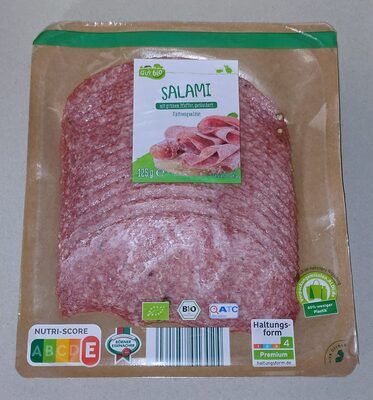
Barcode: 4061458013024
Bio-Salami – geräuchert mit grünem Pfeffer
HARAM
📝 Reason: The product contains Schweinefleisch (pork), which is explicitly forbidden in Islam (Quran 5:3), making the entire product Haram. Other ingredients like Rindfleisch (beef) and Reifekulturen (ripening cultures) are marked as Doubtful due to the absence of Halal certification. The presence of any Haram ingredient automatically classifies the entire product as Haram.
📄 Certificates: None
Ingredients:
Details
Understanding the Halal Status of Bio-Salami – geräuchert mit grünem Pfeffer
In today’s world, many consumers are becoming increasingly conscious of their dietary choices, especially regarding Halal options. One product that often raises questions is the Bio-Salami – geräuchert mit grünem Pfeffer. The Halal status of this product has been identified as HARAM, and it is essential to understand the reasoning behind this classification.
Ingredients Breakdown
The ingredients of the Bio-Salami include:
- Schweinefleisch (Pork) – This is the primary ingredient that categorizes the product as Haram. Pork is explicitly forbidden in Islam, as stated in the Quran (Surah Al-Ma’idah 5:3). Any product containing pork or its derivatives is not permissible for Muslims.
- Rindfleisch (Beef) – Although beef can be Halal, the absence of a Halal logo raises doubts about its categorization. Without proper certification, it cannot be assumed to be compliant with Halal dietary laws.
- Natriumnitrit (E250) – This ingredient is permitted in Halal food unless derived from Haram sources. Without proper certification or declaration, one cannot ensure its compliance with Halal standards.
- Grüner Pfeffer (Green Pepper) – A plant-based ingredient, it is generally regarded as Halal.
- Gewürze (Spices) – Like green pepper, most spices are considered Halal unless they contain prohibited additives.
- Dextrose – This sugar is usually Halal unless derived from Haram sources.
- Natriumascorbat (E301) – Another additive that is typically permitted in Halal food, assuming it is sourced correctly.
- Reifekulturen (Ripening Cultures) – Although essential for the aging process of salami, the lack of Halal certification for this ingredient also casts doubt on its status.
- Buchenholzrauch (Beechwood Smoke) – Generally considered Halal, this ingredient is typically derived from natural sources.
The Implications of Haram Ingredients
As per Islamic dietary laws, if any ingredient is Haram, the entire product is rendered Haram. This is a significant point for consumers, as the presence of pork in Bio-Salami – geräuchert mit grünem Pfeffer directly affects its eligibility as a Halal product. Despite having some ingredients that could be Halal, the overall classification is determined by the most restrictive component, which, in this case, is pork.
Brand and Certification Context
Currently, there are no certifications associated with the Bio-Salami – geräuchert mit grünem Pfeffer that would confirm its compliance with Halal dietary guidelines. For any product to be marketed and consumed as Halal, it should possess the necessary certifications from recognized authorities. This ensures that all components are scrutinized, and consumers can trust that they are adhering to their dietary laws.
Conclusion
In conclusion, the Bio-Salami – geräuchert mit grünem Pfeffer is not Halal due to the presence of Schweinefleisch (pork), along with insufficient assurance regarding other ingredients’ statuses. It is essential for consumers observing Halal dietary laws to be vigilant and informed about the products they choose. Always look for credible certifications and conduct thorough research when selecting items for your diet.

